Knowledge. Shared Blog
August 2019
Let Others’ Mistakes Be Your Opportunity
 Gregory Kolb, CFA
Gregory Kolb, CFA
Chief Investment Officer | Portfolio Manager
Perkins Chief Investment Officer Gregory Kolb suggests that the gap between growth and value stocks may be the result of investors’ cognitive dissonance about which type of equities are likely to outperform in a recession.
Key Takeaways
- Growth stocks have dramatically outperformed value equities as market participants, worried about trade tensions and the aging bull market, seek growth and stability at any price.
- Investors would do well to recall the Nifty Fifty stocks, which peaked in 1973 and then underperformed the S&P 500® Index for the remainder of the decade despite growing earnings.
- Meanwhile, multiples for many value stocks are inordinately low, even among companies that are well capitalized and have competitive advantages. We believe these firms could deliver significant earnings growth and multiple expansion should headline worries ease.
A casual reading of today’s headlines makes clear that many market participants are worried. Slowing global growth, trade wars and political tensions are a few of the key concerns set against the backdrop of an aging bull market and economic expansion. Bond yields have been dropping dramatically since late 2018. Globally, $15 trillion of sovereign debt yields less than zero, and recently the entire German government bond yield curve went negative.
German Government Bond Yield Curve: Land of Make Believe*

Source: Bloomberg, as of 8/6/19. *Willem Buiter, Special Economic Adviser at Citi, referred to current global monetary policy as a “land of make believe” in a “Bloomberg Surveillance” interview on 7/12/19.
Against this backdrop, growth stocks have surged: Tech stocks are up more than 124% over the past five years, double the next best-performing sector and nearly triple the gain of the broader MSCI World Index℠.1 There has also been a bull market in stocks of companies with perceived stability. The price-to-earnings premium of the MSCI World Minimum Volatility Index over the broader benchmark has expanded to 4.0 multiple points from 0.3 points five years ago. Many investors seem to feel that if they can ensure some level of growth, or even just stability, their portfolios will be able to weather any economic turbulence.
Learning from the Past
As excitement builds in these hot areas of the market, investors would do well to remember the experience of the so-called Nifty Fifty in the 1970s. From their peak in early 1973, this group of 50 popular large-cap stocks underperformed the S&P 500® Index by 48% through the end of the decade, even though earnings-per-share growth for these stocks was far higher than that of the broader market index over that span.
On the other hand, investors are deeply skeptical of value/cyclical stocks. The Global Financial Crisis was formative for many who experienced it, animating thoughts of what could go wrong today. Meanwhile, younger market participants are learning to loathe value investing. Value stocks as measured by price-to-book ratio trailed growth stocks by 5.5 percentage points a year from April 2007 through May 2019 – their worst showing in 80 years.2
Cognitive Dissonance Creeps into Investing Mindset
The theory of cognitive dissonance states that holding two ideas that are psychologically inconsistent produces mental discomfort and will motivate a person to find a way to reduce the dissonance, typically in a self-justifying manner. The stark divergence between growth/stable stocks and value/cyclicals suggests that many investors are finding it difficult to simultaneously consider that (1) a recession is looming and (2) they’re going to own value/cyclical stocks.
Instead, investors seem to feel much more comfortable pairing a portfolio of growth/stable stocks with their worried economic/market outlook. Thus, the gap between growth and value stocks may be best understood as a matter of investors’ cognitive dissonance about which type of equities are likely to outperform in a recession.
A Narrow Path to Potential Opportunity
The economy may, in fact, continue to weaken from its strong showing in 2018 and could even tip into recession. There are good reasons to worry about how such a scenario would unfold, given already-stretched monetary policy from the world’s main central banks. Still, we think the fear seems overdone.
In our view, it’s possible to find value/cyclical stocks of companies that are well capitalized and competitively likely to endure and have inordinately cheap valuations. For example, many U.S. banks offer double-digit shareholder returns when combining dividends and buybacks. In our opinion, small-cap stocks provide more opportunity than large caps, and value opportunities are increasingly plentiful outside the U.S. Should the economy rebound, these companies could see tremendous earnings growth upside and, eventually, multiple expansion.
Going beyond the fundamentals to gain a broader understanding of the circumstances driving stock prices may help a discerning investor identify favorable reward-to-risk opportunities. Focusing where others feel discomfort is a good place to start.
For more insights on how investors may uncover opportunities amid market uncertainty, read the full 3Q Perkins CIO Outlook.
1Data as of 7/31/19
2Kaissar, Nir. “Don’t Count Out Value Investing Despite Growth’s Spurt.” Bloomberg, 2019.
Knowledge. Shared
Blog
Back to all Blog Posts
Subscribe for relevant insights delivered straight to your inbox